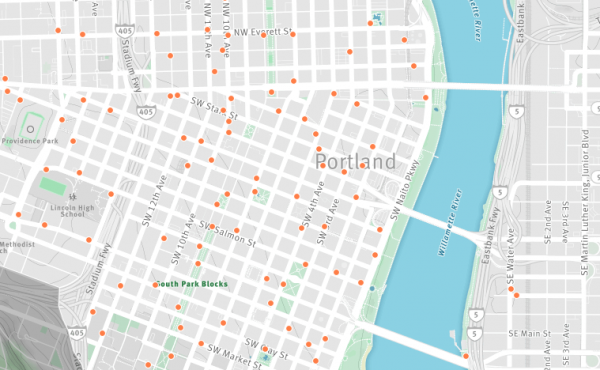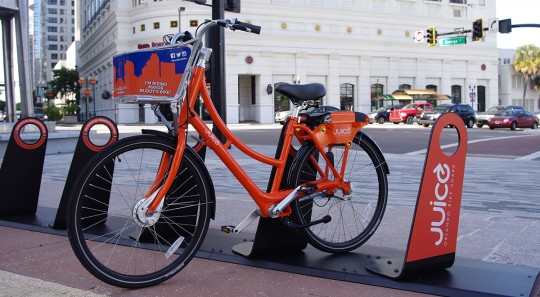
(Image from the city’s feedback website)
Though other cities have seen some memorable freakouts about the prospect of bike sharing stations, Portland hasn’t yet heard many loud complaints that Biketown stations would begrime beloved public spaces.
TriMet, for example, said last week that although it doesn’t allow blue bike “staple” racks on its downtown transit mall (more on that below), it won’t have a problem with orange bikes being parked there.
But so far, there’s one major city department that’s been keeping its distance from bike sharing: Portland Parks and Recreation.
Of the 300 locations being considered for Biketown’s first 100 stations when the Portland Bureau of Transportation launches the system in July, almost none of them appear to be on land controlled by the Parks Bureau.
On some locations, the result is merely odd. Jamison Square, for example, is a major attraction in the heart of the Pearl District, probably BikeTown’s highest-demand residential area and very important to its future revenue. But if the station location proposed across the street doesn’t work out for some reason, the city-owned land in the square is apparently unavailable as a backup.
There’s one large site, though, where the lack of Biketown stations in parks starts to seem seriously disruptive: Waterfront Park. At Salmon Street Springs, for example, a private bike rental company lines its bikes up just south of the plaza all summer. But getting to the closest proposed public bike share station will require people to wait through the unusually long light cycle to cross Naito Parkway. Then it’ll take another cycle to get back to the waterfront, if someone happens to want to ride there.
The same is true at Skidmore Fountain, where the Saturday Market sets up shop all summer.
Is there no room for bike share stations in Waterfront Park’s 30 acres? We asked Parks spokesman Mark Ross. Here’s what he wrote on March 24 (with our emphasis added):
PBOT and PP&R are working together to find the best sites for BIKETOWN locations on PP&R property, or that serve public parks by being nearby in rights-of-way.
Finding space for a pod of bikes is a complex process, requiring identification of an area where this service would be beneficial, and then balancing space needs, safety considerations, and existing activities. We want to explain the complexity of finding a location and all the variables that need to be weighed to help put this conversation in perspective for everyone. It’s not as simple seeing an open area and plunking down a bike share station!
PP&R is very open to the concept of having bike pods if they can work with a specific space, but city parks are generally designed to balance activities that are programmed in (fountains, playgrounds, etc.) and some open space (meadows, benches, etc.) with a specific intent for those spaces to be left open. Maintaining that combination of active and passive space for different types of uses is what makes a park successful, used, and serve the most people. Putting new things into a park that’s already planned with this balance takes careful consideration. Open space has value, just as it is. So, we do not let that open space be used for other active uses without giving it measured thought.
“Waterfront Park is quite long, of course, but it is also quite narrow; and the needs for all park visitors must be considered.”
— Mark Ross, Portland Parks and RecreationPP&R and PBOT have looked at specific sites in Waterfront Park. Waterfront Park is quite long, of course, but it is also quite narrow; and the needs for all park visitors must be considered when making such a decision. The park has many events that use large swaths of the park at various times. The specific locations that PBOT asked us to consider were Saturday Market and Salmon Springs, specifically because they are busy places where people congregate. But because they are busy places, finding space for a pod of bikes with clearance for the activity they would generate was difficult. So after we gave these locations (and several other downtown parks) quite a bit of consideration, we concluded that there was not room for BikeTown stations, given the footprint needed, other activities in those areas, and maintenance access needs, among other considerations. But that has led us to other options, now under consideration.
PBOT and PP&R are taking a look at two potential sites that provide direct access to Waterfront: 1) across Naito from Waterfront at Salmon/Naito (Salmon Springs) and 2) on the sidewalk at Ankeny Plaza (east of Mercy Corps building) – providing access to Saturday Market area.
Similarly, PBOT and PP&R looked together at potential locations in and around both Jamison Square Park and Colonel Summers Park and ultimately felt that the best locations were nearby, rather than in, the parks. The discussions continue, and we’re happy to keep you updated as news develops.
So, to summarize: the Parks Bureau is not allowing bike share stations in any downtown parks, because it feels there is no room.
Here’s the word from PBOT spokesman Dylan Rivera, who went out of his way to get in touch when he heard we were asking about bike share access in the parks:
PBOT is committed to working with Portland Parks & Recreation to find a solution for station locations that are appropriate and respect other park users. PP&R has been a very engaged and cooperative partner.
Advertisement
TriMet worries about design inconsistency but predicts stations on Transit Mall

(Photo: City of Orlando)
There’s a large and ever-growing body of evidence that mass transit users are the biggest single constituency for public bike sharing, and that one of the most important effects of public bike sharing is to make it more convenient to use mass transit.
What’s more, bike sharing seems like a perfect way to mitigate one of TriMet’s longtime operational challenges, which we covered just yesterday: getting people to avoid overcrowding MAX trains with their personal bikes.
So it might seem a little odd that so few Biketown stations are being considered directly on the Portland Transit Mall — the stretch of 5th and 6th avenues that carry almost all the MAX and bus traffic through downtown Portland.
But in an interview last week, TriMet active transportation planner Jeff Owen said TriMet, which plans changes on the mall in partnership with the city and landowner-funded Portland Mall Management Inc., has no problem with bike sharing stations there.
“We’re really supportive — it can do a lot of great things for us,” TriMet active transportation planner Jeff Owen said in an interview last week. “I think we’re totally anticipating good locations for the Mall. … We’re totally excited and knowing that there’s going to be good spots along the Mall.”
That’s a significant endorsement. When TriMet remodeled the Mall in 2009, it paid to remove the standard city bike racks there and use sharper-edged stainless steel ones instead, to be more visually consistent with other features of the Mall.
“There’s a lot of partners — the city, TriMet and others, businesses, Mall Management and others — that put a lot of time and money into the way the Mall feels, operates and looks,” Owen said last week.
But Owen said his understanding is that the station racks of the new Biketown system will be relatively generic.
“I don’t really anticipate much of an issue.”
— TriMet active transportation planner Jeff Owen on bike-share stations on the Transit Mall
“It’s just the bikes themselves that are bright orange,” he said. “Obviously riders’ bikes are going to be all kinds of different colors.”
He said TriMet and Portland Mall Management have avoided any firm commitment to allow bike share stations on the Mall because “we haven’t seen renderings of stations on the Mall.”
“I don’t really anticipate much of an issue, to be honest,” Owen said.
Most of TriMet’s concerns about station placement, Owen said, will come down to operational details like whether a station location might encourage people to bike on the wrong side of the street.
“If you just go out there for a few minutes and watch people, it doesn’t take long before someone on a bike is either operating in the middle lane or on the right side, where the buses and trains are operating,” Owen said. “There might be a location or two where we say we totally understand a customer’s desire to transfer here, but we’d really like to see it on the other side of the road.”
Tonight at 2033 NW Glisan, Portland is hosting the fourth of five open houses to discuss possible Biketown station locations. If you’d like to weigh in on where those stations should or shouldn’t go, you can attend that or the final open house on Thursday in North Portland or enter feedback digitally using the city’s online mapping tool.
If you’d like to contact Portland Parks and Recreation about their position on stations in the parks, you can email Director Mike Abbate at director.abbate@portlandoregon.gov or Commissioner Amanda Fritz at amanda@portlandoregon.gov.
— Michael Andersen, (503) 333-7824 – michael@bikeportland.org
BikePortland can’t survive without subscribers. It’s just $10 per month and you can sign up in a few minutes.




